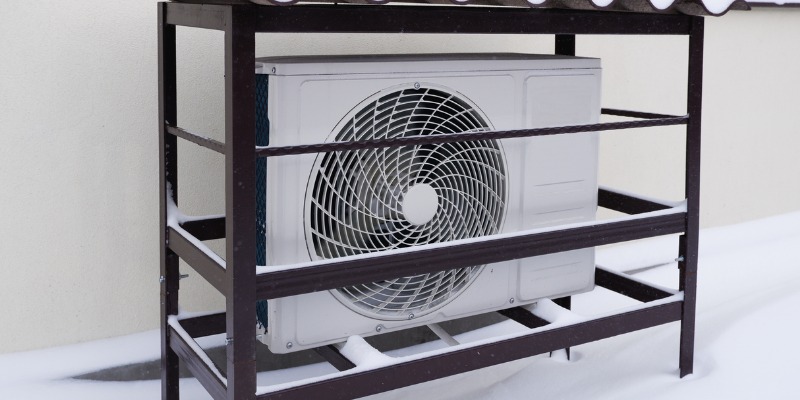
Ice can build up on your heat pump at any time of year, reducing its efficiency and even causing system failures. In this blog, we’ll discuss why ice forms on heat pumps and provide steps to address the issue in both the summer and winter seasons.
How to Remove Ice on Your Heat Pump in the Summer
You may be surprised to find out that your heat pump can ice over in the summer. Here’s why it happens:
- Low refrigerant levels: Low refrigerant can cause a pressure drop which may make the evaporator coil too cold.
- Dirty evaporator coil: Dust and debris accumulation on the evaporator coil can restrict airflow, causing the coil to freeze.
- Faulty fan motor: A malfunctioning fan can cause inadequate airflow and can cause ice formation due to excess moisture.
How to Remove Ice:
- To prevent further damage, turn off the heat pump and allow the ice to melt naturally.
- Carefully remove any debris, such as leaves or dirt, from the evaporator coil to improve airflow.
If you are concerned about doing this yourself, you can call in HVAC professionals to perform heat pump maintenance in order to clean the coils and any other parts of the system.
Steps to Prevent Ice Formation:
- Ensure that your heat pump has adequate refrigerant levels and a clean evaporator coil by scheduling regular maintenance checks.
- Regularly replace or clean the air filter.
- If you suspect a faulty fan motor, seek professional help to diagnose and repair the issue.
How to Remove Ice on Your Heat Pump in the Winter
The cold weather plays a major role in heat pumps icing over in the winter. Here’s what to watch out for:
- Defrost cycle malfunction: Heat pumps have a built-in defrost cycle. If this cycle malfunctions, ice can accumulate on the unit.
- Blocked outdoor unit: Snow or other debris can obstruct airflow around the outdoor unit, leading to ice formation.
- Low temperatures: In extremely cold conditions, the heat pump may struggle to extract enough heat from the outside air, causing the outdoor unit to freeze.
How to Remove Ice:
- Turn off the heat pump and allow the ice to melt naturally before resuming operation.
- Remove any snow, ice, or debris around the outdoor unit to improve airflow and prevent further ice buildup.
Steps to Prevent Ice Formation:
- Ensure your heat pump’s defrost cycle is functioning properly. If you suspect an issue, consult a professional technician.
- Regularly check the outdoor unit for obstructions and remove any snow, ice, or debris.
- In regions with extreme cold, consider installing a cold weather kit to enhance the heat pump’s performance and minimize the risk of ice buildup.
Schedule Heat Pump Maintenance in Guelph
Heat pump ice buildup can be a nuisance, but understanding the reasons behind it and taking preventative measures can minimize its impact. Contact Guelph ClimateCare today to maximize the efficiency of your heat pump!








